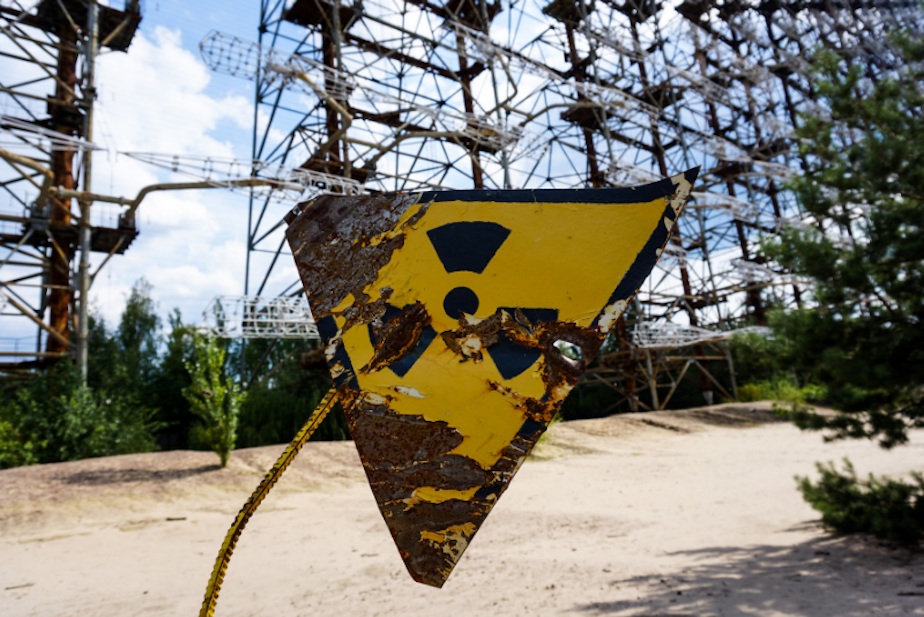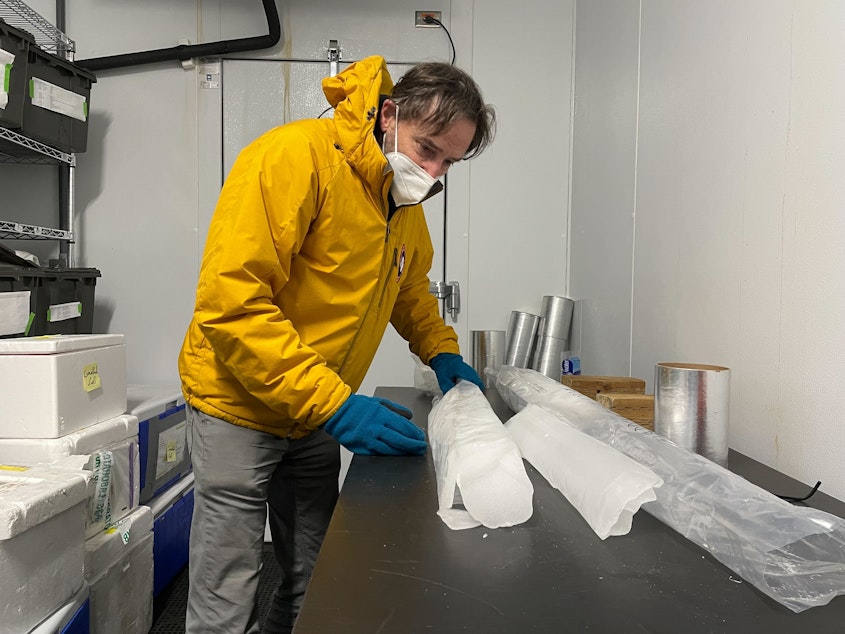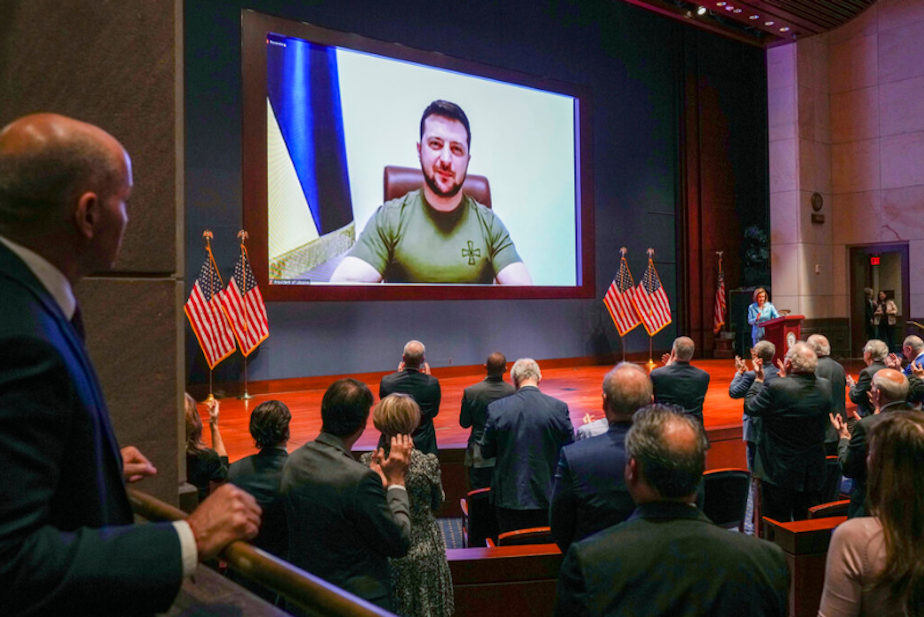How likely is nuclear radiation to reach Washington?: Today So Far

Ever since Russia invaded Ukraine, there have been headlines, speculation, and fear of nuclear bombs being launched at the Northwest. After all, the Puget Sound region has about a third of the nation's nuclear stockpile. There's also the thought of radiation getting kicked up somewhere else and traveling to our region.
This post originally appeared in KUOW's Today So Far newsletter for March 16, 2022.
These WWIII scenarios are fit for a Michael Bay movie. And like a Michael Bay movie, while sensational, nobody really likes them. But for some reason, they keep showing up. And admit it, we all keep watching them, just like we pay attention to nuclear headlines.
Instead of stressing out, let's talk it out with people who know a thing or two about all this.
RELATED: Walking through stressful headlines
First, Mark Henry, radiological emergency preparedness and response supervisor with the state Department of Health. He's the guy watching radiation levels in the state.
Can radiation get kicked up elsewhere on the planet and travel to the Northwest?
Washington officials observed radiation reaching the Northwest after the 1986 Chernobyl nuclear power plant accident in Ukraine. They also picked up radiation from the 2011 Fukushima incident. Henry says that the radiation levels reaching Washington from Chernobyl were equivalent to a person taking an airplane ride (yes, you receive more environmental radiation up there than down on the ground).
Sponsored
“It was very, very low, but it was detectable,” Henry said, adding that levels in the Northwest from Fukushima were just above naturally occurring background radiation levels.
“If something happens over there, say they attack a Chernobyl facility, to something happening to a reactor, could we see that? It’s very possible that we both could or could not," Henry said, noting that the radiation would have to make its way into the upper atmosphere, then get into the Jetstream, and then drift our way. "If it did, we are looking at levels we saw with Fukushima or less.”
What if a nuclear bomb goes off in the Northwest?
“I think that is a pretty large exaggeration to start looking at if Washington state got bombed,” Henry said. “There are a lot of concerns other than just the radiation … if Washington state is getting bombed, then a lot of other states are getting bombed. That is not keeping me up at night.”
What about potassium iodide?
Sponsored
Google search trends in the Northwest for "potassium iodide" have skyrocketed over the past few weeks. Spokane is most interested, followed by Seattle/Tacoma, Yakima, and Portland.
While potassium iodide is effective for blocking radioactive iodine in the thyroid, it’s not some radioactive panacea. Washington state provides it to emergency responders at nuclear power plants. It’s not as helpful for the scenarios we’re covering. It protects against radioactive iodide, but doesn’t do much against other radioactive materials that can show up. It should also be noted that potassium iodide can have some serious side effects.
“If you’re even considering buying it, I would check with your doctor first,” Henry said. “We are not recommending that people go out and buy potassium iodide. That is not needed in this situation.”
What's your plan?
It's technically illegal for Washington state to have a plan for a nuclear attack.
Sponsored
During the Cold War, Washington had evacuation plans and shelter contingencies in case the Soviets launched a nuclear bomb at us. But in a symbolic effort to move away from that era, Washington passed a law in 1984 that prevented its Emergency Management Division from making plans "for emergency evacuation or relocation of residents in anticipation of nuclear attack." Eventually, however, people remembered that other countries had nuclear bombs too, like North Korea. There was an effort to nix the law in 2017, but it didn't pass.
That doesn't mean we don't have "plans," however.
"We have developed strategies to ensure we can deliver food and resources, provide health care services, and restore communication systems throughout any disaster response," said Karina Shagren, spokesperson for the Washington Military Department.
Such plans are extensive and cover earthquakes, tsunamis, radiological events, and other disasters. So while Washington hasn't kept up any bunkers over the years, it's not clueless.
What about worst-case scenarios?
Sponsored
On a personal level, everyone should have 14 days of food, medication, water, and other supplies for any emergency. It's also a good idea to keep supplies in your car. Basically, think about what you would do if you were in the Walking Dead, minus the walking dead part.
The federal government does have some advice for a nuclear event, which basically breaks down to this:
- Stay indoors. Brick or concrete is best. Stay as close to the interior of a building as possible.
- If you are outside, get inside. Remove all contaminated clothing and wash unprotected skin. Don't touch your eyes, nose, or mouth.
- Stay inside for at least 24 hours, unless officials say otherwise. Listen to the radio/TV for updates.
Or as Mark Henry would advise: "Get in. Stay in. Tune in."
He also has some good advice for everyone, right now.
Sponsored
“Take some time to relax, take care of your business, go about your daily life … take care of yourself. And just stay informed.”
AS SEEN ON KUOW

Eric Steig is the chair of the Departments of Earth and Space Sciences at the University of Washington. He studies ice samples from Antarctica to learn how the planet warmed and cooled before humans influenced the climate. (Brandi Fullwood / KUOW)
DID YOU KNOW?
“Forgive Mom and Dad Day” is on Friday, March 18. Yep. It’s an official holiday, thanks to Ruth and Thomas Roy. The couple has copyrighted more than 70 holidays over the years, with an emphasis on the bizarre. For example, March 3 was “What if Cats and Dogs Had Opposable Thumbs Day.” July 27 is “Take Your Houseplants For A Walk Day.” Some have been included in widely-printed calendars. I’m bringing up Forgive Mom and Dad Day in advance, because let’s be honest — no parent is perfect and we all probably need a couple days to mentally prepare.
Take my parents, and Superman, for example. I was made in the ’80s and my folks were rather buttoned-up people. So when a very young Dyer first asked where babies come from, my parents clammed up. Superman with Christopher Reeve was all the rage at the time, so they opted to bypass the birds and the bees and told me that I was found in a crystalline space ship that crashed behind their house after my planet blew up. That’s the story I went with for many, many … many years without any correction. Now, I’m not entirely blaming my parents for the fact that I grew up to wear Clark Kent glasses and pursued a career in journalism, or how being a nerd became a cornerstone of my personality. But, I mean, come on!
ALSO ON OUR MINDS

WATCH: 'I call on you to do more,' Zelenskyy tells U.S. lawmakers
Addressing members of Congress via video link, Ukrainian President Zelenskyy issued an emotional plea for increased defense support to Ukraine.

